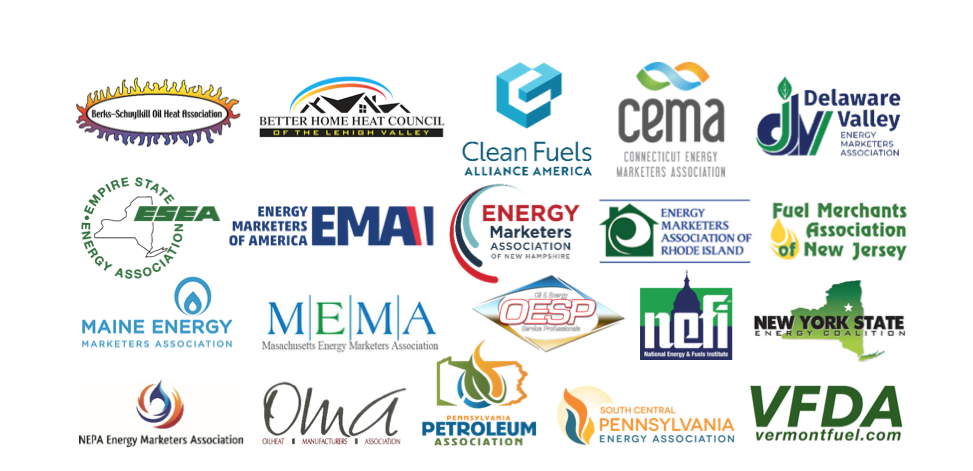
For Immediate Release: contact Shelly Sindland for more information: shellysindland@ctema.com or 860-992-9045
CEMA, along with 19 other regional energy providers, urged Congress today to act now regarding the volatility In Markets. CEMA joined NEFI and other trade groups in a letter that was sent to Congress today suggesting steps that they should take to help alleviate the extreme price volatility that we are experiencing. The letter details the following issues:
Offer heating fuel dealers 100% guaranteed SBA loans for all receivables.
Increase and expand the Section 25C tax credit for cost-saving home efficiency upgrades.
Enact long-term extensions for all renewable fuel tax incentives.
Encourage greater U.S. energy production.
Boost fuel assistance to $5.1 billion for Fiscal Year 2023, with an additional $500 million contingency fund for emergencies.
Increase funding for the Commodity Futures Trading Commission (CFTC) to $365 million.
See full letter below:
May 12, 2022
United States Congress
U.S. Capitol Building
Washington, D.C. 20510
Subject: Renewable Liquid Heating Fuels for American Energy & Economic Security
Dear Senators and Representatives:
The undersigned organizations, representing mostly small Main Street energy providers, urge immediate action in response to global events and resulting extreme volatility in the energy markets.
Our retail members – often referred-to as “fuel dealers” – are multi-generational family businesses that deliver a safe, reliable, and efficient heating fuel to 5.6 million American homes.[i] In many cases this fuel, once referred to “heating oil,” is blended with biodiesel and other advanced biofuels to immediately and significantly lower greenhouse gas emissions (GHGs) in the heating sector. [ii] With support from the National Oilheat Research Alliance (NORA) and the biofuel industry, fuel dealers and appliance manufacturers are continually and voluntarily increasing the amount of advanced biofuels blended into the fuel supply to comply with or exceed the GHG reductions demanded in many states. It also improves fuel performance, supports rural economies, and contributes to energy and environmental security.
Unlike gas and electric utilities, our retail members personally deliver heating fuels and related products and services to American homes. They are active in the communities they serve and have longstanding relationships with customers that often span generations. As a result, they see firsthand the hardship that inflation is causing millions of Americans and are doing all they can to help. They may offer fuel at discounted rates to low-income families, cost-saving fixed price or pre-payment plans, and budgeting options. Many participate in state energy assistance programs and donate fuel to vulnerable seniors, disabled veterans, and active-duty military families.
Like their customers, heating fuel dealers also struggle in high price environments. Retailers experience strained lines of credit with banks and suppliers and increased cash demands upon loading at the terminal. Some mistakenly blame wholesale and retail fuel dealers for high prices and accuse them of “price gouging,” despite the fact these businesses operate in very competitive markets that discourages such activities. Our members are working to educate consumers on the causes of the energy crisis and identify programs and resources that may provide even the smallest amount of relief.
Congress must do its part to help struggling families and small businesses, address global climate change, and enhance American energy security during this crisis. Our recommendations include:
- Offer heating fuel dealers 100% guaranteed SBA loans for all receivables aged 60-200 days for a six-month period following anytime heating oil futures exceed $3.00 per gallon. This will prevent localized supply disruptions and layoffs that might result when traditional banking relationships fail to fund critical inventories and payroll during historic high price episodes.
- Increase and expand the Section 25C tax credit for cost-saving home efficiency upgrades. The existing credit has a $500 lifetime cap and offers only $150 for installation of a more efficient furnace or boiler. This will not incentivize a homeowner to upgrade an existing system, which can cost at least $9,000 for a typical home. Congress should therefore increase the credit to 30% of the cost of installation with no caps or limits. The credit should also be refundable and fuel neutral, so all homeowners benefit fully, irrespective of income level or the type of heating fuel they prefer to use. Congress should incentivize installation of the most efficient system available for every fuel on the market and, for oilheat consumers, systems designed to utilize high blends of advanced biofuels.
- Enact long-term extensions for all renewable fuel tax incentives. Blending biodiesel and other advanced biofuels into home heating oil not only reduces emissions but can also lower costs. Unfortunately, most renewable fuel tax incentives are set to expire at the end of the year. Their lapse will result in significant market disruptions and an increase in greenhouse gas emissions. We urge Congress to extend the biodiesel, renewable diesel, and cellulosic biofuel tax credits for a minimum of three years.[iii] It is worth noting the cellulosic biofuel tax credit will support the production of ethyl levulinate (EL), a net-negative carbon liquid fuel being developed in northern New England for use in the heating oil market.[iv]
- Encourage greater U.S. energy production. In response to the events in Europe, Congress should take steps to increase production of conventional energy resources here at home. This will reduce energy costs while providing time to deploy more efficient technologies and renewable fuels to reduce fossil fuel use and address climate change.
- Boost fuel assistance to $5.1 billion for Fiscal Year 2023, with an additional $500 million contingency fund for emergencies.[v] We are grateful for the unprecedented level of funding for the Low-Income Home Energy Assistance Program (LIHEAP) throughout the pandemic.[vi] Our members continue to see an unprecedented level of need for fuel assistance, however, as Americans continue to face economic hardship due to historic inflation and geopolitical events beyond their control.
- Increase funding for the Commodity Futures Trading Commission (CFTC) to $365 million as per its budget request.[vii] Thanks to recent Senate confirmations, the CFTC now has a full slate of Commissioners ready to carry out its important work of policing fraud, manipulation, and excessive speculation in the commodity futures markets. This CFTC is historically underfunded and needs more resources to tackle today’s challenges. Congress should also inquire with Commissioner Behnam on any additional authorities that might assist with its important mission.
While not an exhaustive list of policy options at your disposal, these proposals would constitute meaningful relief for our members and their consumers. It is imperative that these actions be taken well in advance of the next heating season. We are happy to meet with you to discuss these matters further.
Thank you for your consideration.
Sincerely,
Berks-Schuylkill Oil Heat Association www.bsoha.org
Better Home Heat Council of the Lehigh Valley www.bhhclv.com
Clean Fuels Alliance America www.cleanfuels.org
Connecticut Energy Marketers Association www.ctema.com
Delaware Valley Energy Marketers Association www.dvema.org
Empire State Energy Association www.eseany.org
Energy Marketers of America www.energymarketersofamerica.org
Energy Marketers Association of New Hampshire www.energymarketersassociationnh.com
Energy Marketers Association of Rhode Island www.warmth4ri.com
Fuel Merchants Association of New Jersey www.fmanj.org
Maine Energy Marketers Association www.maineenergymarketers.com
Massachusetts Energy Marketers Association www.massenergymarketers.org
National Assn. of Oil & Energy Service Professionals (OESP) www.thinkoesp.org
National Energy & Fuels Institute (NEFI) www.nefi.com
New York State Energy Coalition www.nysecnow.org
Northeast Pennsylvania Energy Marketers Association www.nepaenergy.org
Oilheat Manufacturers Association www.oma-web.org
Pennsylvania Petroleum Association www.papetroleum.orgSouth Central Pennsylvania Energy Association www.southcentralpaenergy
[i] U.S. Census Bureau, American Community Survey (ACS), Fuel Oil Use by Occupied Housing Units, 2020 Five-Year Avg. Percent (%) of homes is calculated as a percentage of total state occupied housing units.
[ii] Biodiesel is a sustainable advanced fuel produced from a diverse array of feedstocks that reduces greenhouse gas emissions by an average of 74-percent with respect to conventional petroleum, according to Argonne National Laboratory.
[iii] The biodiesel and renewable diesel tax credit can be found at 26 U.S.C. §40A and the cellulosic biofuel tax credit (known formally as the second-generation biofuel producer tax credit) can be found at §40(b)(6).
[iv] Biofine Developments NE and EarthShift Labs 2019 GREET analysis shows EL reduces emissions by over 100% in heating applications.
[v] On April 20, 2022, NEFI joined the American Gas Association, American Public Gas Association, American Public Power Association, Edison Electric Institute, National Energy & Utility Affordability Coalition, and National Rural Electric Cooperative Association in a letter to Congressional LIHEAP appropriators. It requests $5.1 billion in regular grant funds to states and a $500 million contingency fund for emergencies.
[vi] In response to the pandemic, Congress provided an unprecedented $8.3 billion in LIHEAP funding during Fiscal Year 2023, more than double the typical annual appropriation.
[vii] https://www.cftc.gov/sites/default/files/2022-03/CFTC_FY_2023_President_Budget_Report_032122.pdf
